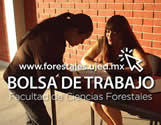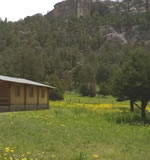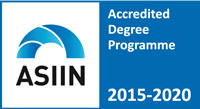ASIIN Acrredited Degree Programme 2015 - 2016
What is ASIIN e. V.?
ASIIN e. V. is a German registered association supported by many organisations, which view the quality of university education as a central concern.
It is an alliance of universities and universities of applied sciences, expert societies, profession-related organisations,
industrial and business associations and unions. It was first founded in 1999 as the non-profit association called ASII for the accreditation
of degree programmes in engineering and informatics, in 2002 the fields of natural sciences and mathematics were included, and it became ASIIN.
Since 2000, ASII or ASIIN has the right to award the accreditation seal of the German Accreditation Council, in addition to the ASIIN quality seal.
In 2008, the activities of ASIIN e. V. were expanded with activities such as the establishment of panels, criteria, and procedures for the evaluation of QM systems in studying and teaching.
ASIIN e. V. has participated in national and European projects on the quality of university education at a very early stage and has been involved in the coordination processes of European and international organisations as a member.
What does it mean to be accredited by ASIIN e. V.?
The individual degree programmes are the subject matter of the programme accreditation. A successful accreditation confirms that a degree programme fulfils the given requirements. This implies a qualification process, the interaction of its elements and the level of achievement of objectives – i.e. the attainment of the intended learning outcomes for students. In addition, there are external demands made by the political, legal and socio-economical environment, within which the degree programme is designed and realised.
The quality of a degree programme is also demonstrated in the success that graduates achieve in their profession. It depends on the engagement of all stakeholders within and outside of the HEI. We therefore see it as decisive for the success that relevant stakeholders at the HEI are involved in the planning, steering, and implementation of this process.
ASIIN aims to review the logics and efficacy of a qualification process within a degree programme, centring the overall assessment on the effective attainment of the goals set by the HEI.
Contact
M.C. Liliana Banda EnríquezIntegral Training Coordinator
E-mail: l.banda@ujed.mx
Location: Upstairs Medical Services
Degree programme alignment to both the European Qualifications Framework (EQF) and the Mexican Qualification Framework (MMC)
The graduates of the Forestry Sciences Engineering are strongly focused on the transformation processes of wood boards, sawmilling, drying and quality of products, pulp and paper industries; on forest management aiming to design, implementation and evaluation of plans and programmes for sustainable use, forest measurement for calculating productivity and on forest restoration, which implies the characterization, diagnosis and project development for improving and maintaining the diverse ecosystems, all of these supported by the use of Geographic Information Systems tools; but they are not focused on the design, construction and maintenance of heavy machinery sawmills, construction of roads and bridges, etc., as the usual English professional sense of the word “engineer” implies.
The Forestry Sciences Engineering Bachelor degree programme is aligned to Level 6 of both the European Qualification Framework (EQF) and the Mexican Qualification Framework (MMC).
The shaded sections show the areas where both Frameworks agree.
Levels in the European Qualifications Framework (EQF):
| EQF Level | Knowledge | Skills | Competence |
|---|---|---|---|
| Level 6[2] |
Advanced knowledge of a field of work or study, involving a critical understanding of theories and principles. |
Advanced skills, demonstrating mastery and innovation, required to solve complex and unpredictable problems in a specialized field of work or study. |
Manage complex technical or professional activities or projects, taking responsibility for decision-making in unpredictable work or study contexts; take responsibility for managing professional development of individuals and groups. |
Levels description:
| MMC LEVES | REFERENTIAL OF LEARNING OUTCOMES ASSOCIATED TO EACH MMC LEVEL |
CERTIFICATES, DIPLOMAS, TITLES AND DEGREES ASSOCIATED TO THE MMC LEVEL |
ESTIMATED STUDY PERIODS FOR REACHING A QUALIFICATION OF THE MMC LEVEL |
MINIMUM REQUIRED CREDITS |
|---|---|---|---|---|
|
LEVEL 6 University Specialization |
This level carries advanced knowledge of a field of work or study which requires a critical understanding of theories and principles. It involves advanced skills demonstrating mastery and innovation required for solving complex and unpredictable problems in a field of work or study. It implies managing activities or projects, technical or professional, taking responsibility for decision making in unpredictable work or study contexts; as well as taking responsibility regarding managing professional development of individuals or groups. This level corresponds to the first stage of tertiary education, which does not lead directly to an advanced research qualification –level 5 of the International education standard classification (ISCED) designed by UNESCO and approved in Geneva, by the International Conference about education in 1975. |
Bachelor degree and equivalent (in Mexico it includes Engineering). |
4 to 5 years. As an academic background, it requires at least level 4 of the MMC studies. Level 5 studies can be part of the 4 to 5 years that it takes to reach this educational level. It is organized on a regular basis in annual or semi-annual study periods. |
240 to 300 credits (These credits can include the ones gotten in level 5). |
Mexican Educational System
Next, a chart that shows information about the Mexican Educational System is shown; it is founded on the 3rd Constitutional Article, and taken from the Educational System of the Mexican United States.
General scheme of the National Educational System
Schooled Educational System
| Tipo educativo | Level | Years | Competences |
|---|---|---|---|
| Basic Education | Preschool | 3 | Some knowledge is imparted and the development of habits is promoted. |
| Elementary | 6 | Pupils are initiated in the scientific knowledge and in the social disciplines. | |
| Secondary | 3 | Scientific knowledge is widened and reaffirmed through observation, investigation and practice. |
|
| High School Education | Professional Technician | 3 | Instructed in industrial and service activities, and also for them to continue with higher education studies; that is why this education is both terminal and Propaedeutic, and it aims that the student can incorporate into the labour market. |
| Baccalaureate | 3 | Propaedeutic educational level, when it is concluded, students receive a certificate as baccalaureates which accredits their preparation to continue with higher education studies. Its objective is to offer a formative and integral education, which includes the acquisition of scientific, technical and human knowledge, with several research methodologies and master of language. It is subdivided into general and technological baccalaureate. |
|
| Higher Education | Superior Technician | 2 to 3 | The student is trained for exercising a profession, by issuing a diploma. |
| Bachelor’s degree | 4 to 5 | The student is trained for exercising a profession, by issuing a diploma. | |
| Postgraduate | 1 to 4 | Training of professionals with a high specialization in different knowledge areas. |
Formalities
For those who are processing Title or Professional Certificate
Institution code: 100001
Careers code:
Forestry Sciences Engineering: 305303






